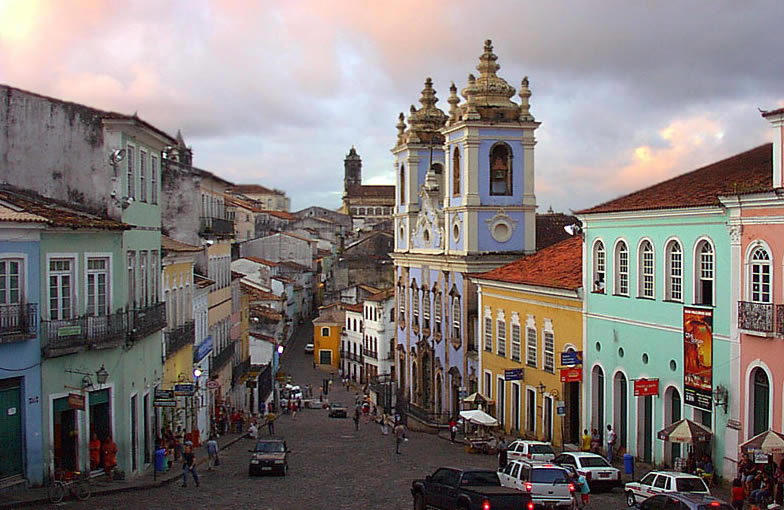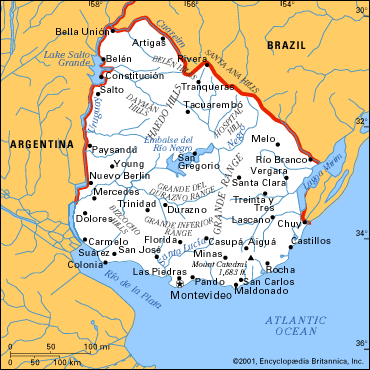
I’ve seen these guys in my neighborhood. Photo source
Before I came to Brazil, I don’t think I even knew a police strike was possible.
But the Military Police in Bahia have been on strike for the past seven days, making Salvador a more dangerous city than it normally is. Over 3,000 soldiers from the Brazilian military have arrived in Salvador to provide an extra measure of security. The story has been reported in the international press, and I’ve JUST found out that we made it into an “emergency travel alert” on the U.S. consulate’s website.
This strike is strategically timed to pressure the government to raise police salaries and resolve the problem before Carnaval. Carnaval in Salvador is one of the world’s biggest street parties and already has a reputation for being violent, so imagine how much worse it would be with a weakened police force. The state would lose a lot of tourism dollars.
Things are bad. But with that said, they’re not THAT bad. Not as bad as the media might have you believe. When you read about a “wave of violence,” the “tripled homicide rate,” and the “tense atmosphere” as it’s being reported, it makes the city sound like a war zone. And it’s not quite.
First, let’s look at this rather misleading phrase:
“Official figures suggest the murder rate has more than doubled in the state capital, Salvador, since police stopped work there on Tuesday.” – BBC News
Police have not “stopped work.” Not all of them, anyway. I read in a local paper that about a third of the police force is on strike. So there are still police around, just not as many. The BBC quote makes it sound like there’s NO law enforcement whatsoever.
Now let’s look at this more-than-doubled homicide rate.
The good (?) thing about homicides in Salvador is that they are overwhelmingly drug-related (someone owed someone money), revenge-related (husband kills wife’s lover), or deadly-fight-breaking-out-at-a-bar-late-at-night related. Mostly the former. Essentially, it’s unusual for someone to be killed as an innocent bystander.
“Senseless” violence like school-shooting type incidents or random-nut-going-on-a-rampage situations are so unusual that when Brazil’s first-ever school shooting happened in Rio de Janeiro state last year, the country – and the president – was absolutely shocked. It had been completely unheard of and unthinkable. As one of my students said to me, “Of course we have violence because of the drug trade, it’s logical. But at least we aren’t crazy like some of the American and European killers.”
Even among people I’ve known who have been robbed on the street – even robbed at gunpoint (including my husband) – if you cooperate with the robber and give him your stuff, it’s unlikely he’ll hurt you. All the cases I’ve heard of where the victim was beaten up or stabbed were because they tried to fight back.
Regarding the 95 homicides in the past 7 days of the strike, I’ve been reading up and quite a few of them are “de madrugada” (in the wee hours of the morning) – when no one should be out on the streets anyway.
Here’s another quote:
Troops surrounded the building Monday as the strike that has paralyzed the city moved into its sixth day. – Boston Globe
The strike has not “paralyzed the city.” There has been looting – including one of my favorite ice cream spots a 5-minute walk from my house. But it’s not a lawless free-for-all. Stores are still open for business as usual, though some are closing earlier than their normal 6 or 7 PM. Buses are still running. OK, so schools and colleges are delaying the beginning of the new semester, which was supposed to start around now. But I wouldn’t call that “paralysis.”
About the “climate of tension” – there are several thousand police officers and their families camped out in a legislative assembly building, and several hundred soldiers were sent to try and get them out (because clearly, getting sleeping striking police officers out of a building is more important than protecting the streets, but I digress). Rubber bullets have been fired. One person has been hurt by them. Yes, the climate is tense – in one very specific tiny area of the 273-square-mile city.
Here’s another example – a band of people marched through the streets of Nordeste de Amaralina (already one of Salvador’s worst neighborhoods) yelling. One of them had a revolver. They didn’t loot any stores. They didn’t shoot anyone. All they did was yell and scare everyone. LAME. Incidents like this have caused some to suggest that some of this “surge of violence” is being instigated by friends of the police themselves, in order to increase the pressure to acquiesce to the salary demands.
To be fair, I’m writing this from the perspective of someone who is doubly blessed – I live in a touristic neighborhood, so this is one of the “priority” areas for receiving police/army protection; and my evening students are on vacation, so I don’t have to wait for the bus or walk home at 10 PM like I normally would.
However, from what I can see, Bahians are taking a few extra precautions (closing stores earlier, avoiding going out at night unless necessary) but other than that are simply putting their heads down and pushing through this “difficult” time in the city’s life.


